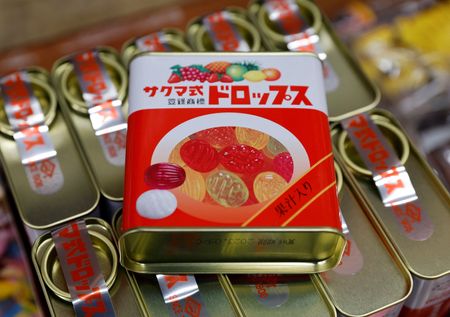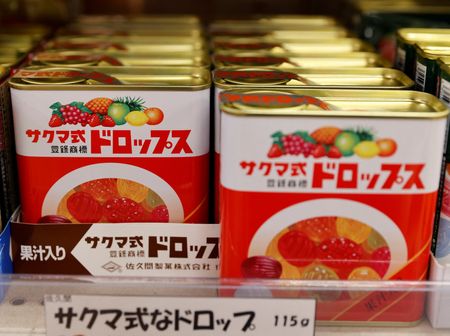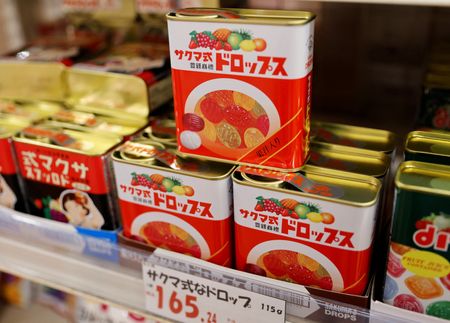By Kantaro Komiya and Daniel Leussink
TOKYO (Reuters) – A beloved Japanese candy eaten by generations, so iconic it even appeared in a hit anime film, has come to the end of the line, a victim of surging raw material and energy prices.
Tokyo-based Sakumaseika Co said on Wednesday that it would go out of business in January due to rising production costs, a labour shortage and a drop in sales of its main product “Sakuma’s Drops”.
The discontinuation of its trademark candy – hard, colourful fruit drops sold in a red steel can – threw Japan into mourning.
“We always had a can at home when I was in grade school,” said 53-year-old sweets-shop owner Naoe Watanabe, remembering how he used to use a 10-yen coin to pop open the lid of the treat – a staple in corner candy shops for 114 years.
“It feels like a sign of the times. There are so many choices now, compared to when I was a kid,” he said.
Sakumaseika said it hadn’t raised the price of the product, which consists of eight flavours such as strawberry and lemon, for years. Many Japanese firms remain hesitant to raise prices at all or fully pass on surging input costs out of fear of losing customers.
The future of Sakumaseika’s 100 or so employees remained uncertain, a company representative said. The company declined to comment further.
Established in 1908 by confectioner Sojiro Sakuma, Sakumaseika produced the candy through the air raids of World War Two, inspiring anime giant Studio Ghibli to immortalise it in its 1988 film “Grave of the Fireflies”.
In that film, set during the war, an orphaned girl struggling to survive with her brother, carries with her the red can of Sakuma’s Drops – one of the siblings’ few possessions after their house is destroyed.
SPOILED FOR CHOICE
Hiroshi Matsuzawa, a snacks store owner on a popular Tokyo shopping street, said Sakuma’s Drops were mostly popular with older consumers, while children were spoiled for choice with countless new products.
Teruyo Ishiguro, who runs a mom-and-pop “dagashiya” snacks store – traditionally a pit-stop for children on their way home from school – said she had stopped carrying Sakuma’s Drops last year, noting that most buyers tended to be in their 50s or older.
“It’s very sad to see something disappear that’s been around for so long,” the octogenarian, who has been selling snacks for more than 60 years, told Reuters.
Near double-digit wholesale inflation and a weak yen have squeezed profits at many food producers. In January, the maker of popular corn snack Umaibo raised prices for the first time since the snack’s 1979 debut, making national headlines.
Sakumaseika suffered a net loss of more than 150 million yen ($1 million) in the 2021 financial year, according to credit survey firm Tokyo Shoko Research, which first reported the company’s closure on Wednesday.
Still, all is not lost for fans.
Rival Sakuma Confectionery Co, which was formed when its management parted ways with Sakumaseika’s after the war, will continue to produce a similar product, confusingly named Sakuma Drops, carried in a similar can but in green.
“As a competitor, we feel sad” about Sakumaseika’s exit, said a Sakuma Confectionery spokesperson. “But perhaps we tried harder to try new ways, a new product line-up.”
($1 = 145.2900 yen)
(Reporting by Kantaro Komiya, Daniel Leussink, Issei Kato; Editing by Elaine Lies, Chang-Ran Kim and Ana Nicolaci da Costa)



